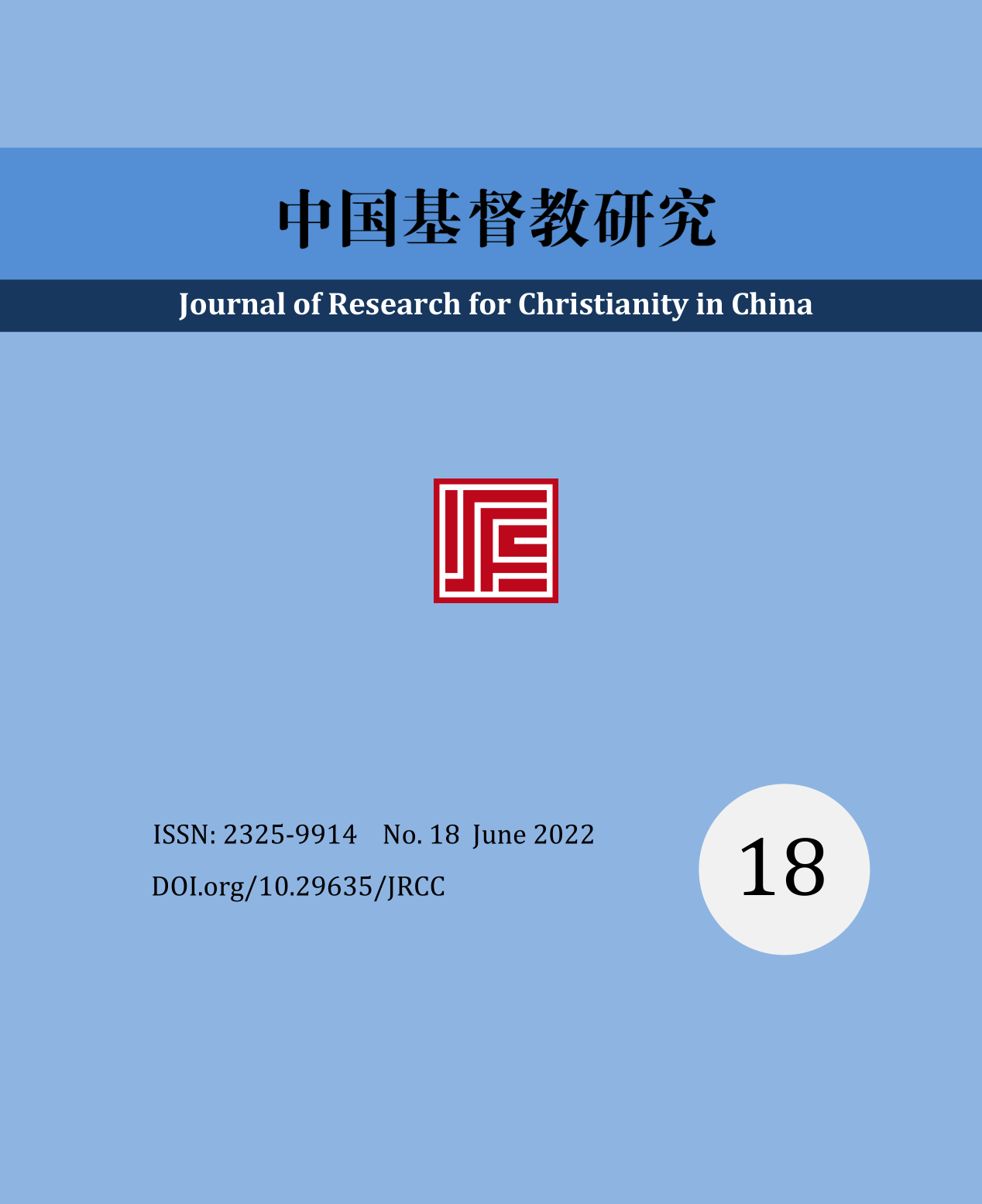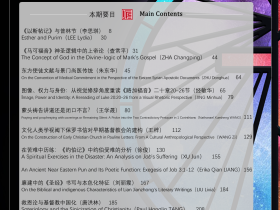中国基督教研究
Journal of Research for Christianity in China
ISSN:2325-9914
本刊已加入华艺线上数位图书馆,并加入DOI数据库。
DOI.org/10.29635/JRCC
《中国基督教研究》(半年刊)由美国洛杉矶基督教与中国研究中心,与中国上海大学宗教与中国社会研究中心联合编辑出版,创刊于2013年,国际刊号为2325-9914。投稿或任何意见,请发送至电子邮箱:ChristianStudies@163.com。
This journal is collected in AIRITI Library and indexed in DOI database.
Journal of Research for Christianity in China (Semi-Annual, ISSN: 2325-9914) is published jointly by the Center of Chrisitanity and China in Los Angeles, USA and the Center for the Study of Religion and Chinese Society, Shanghai University, China. This journal was founded in 2013. Submissions or any comments should be sent to this email address: ChrisianStudies@163.com. More information, please visit this website: ChineseCS.cc.
注:已通过初审的文章,正在进行匿名评审。评审通过后,将陆续在本刊刊登。如有查询,敬请联系本刊。
征稿启事:https://chinesecs.cc/6045.html
注释体例:https://chinesecs.cc/4754.html
本刊从2021年第17期起开始支付薄酬,以表谢意。之前的文章恕不补发稿费。感谢支持。
编辑委员会EDITORIAL BOARD
顾问Editorial Advisor:
李 灵(美国洛杉矶基督教与中国研究中心)
Daniel L. LI (Christianity and China Research Center, Los Angeles)
主编Editor in Chief:
肖清和(上海大学)
Qinghe XIAO (Shanghai Unviersity)
副主编Associate Editor-in-Chief:
俞 强(上海大学)
Qiang YU (Shanghai University)
彭 睿(南昌大学)
Rui PENG (Nanchang University)
刘 平(复旦大学)
Ping LIU (Fudan University)
编辑委员会Editors Committee:
郭建斌(西南民族大学)
Jianbin GUO (Southwest Minzu University)
宋怀思(湖北民族大学)
Huaisi SONG (Hubei Minzu Universtiy)
谢伊霖(暨南大学)
Yilin XIE (Jinan University)
奚 望(北京大学)
Wang XI (Peking University)
聂 利(中南民族大学)
Li NIE (South Central University for Nationalities)
王学晟(台湾中原大学)
Nathanael WANG (Chung Yuan Christian University)
孙良慧(美国圣母大学)
Vicky Lianghui SUN (University of Notre Dame)
助理编辑Assistant Editor:
王艺(上海大学)
Yi WANG (Shanghai University)
Journal of Research for Christianity in China (Semi-Annual, ISSN: 2325-9914)
No. 18, June 2022
《中国基督教研究》半年刊·ISSN:2325-9914
2022年6月·第十八期
本期执行主编:宋怀思

目录
编者的话... 1
From the Editor
特 稿... 6
Special Articles
圣灵和幽灵:基督教共产主义简述(李灵)... 7
Holy Spirit and Ghost:A Brief Introduction to Christianity and Communism (LI Ling)
家国心态与中国基督教研究(李向平)... 18
Family-State Mentality and Chinese Christian Studies (LI Xiangping)
一般论文... 40
Articles
战斗的福音:二十世纪基督教政治神学论评(安希孟)... 41
A Review on Christian Political Theology in the Twentieth Century (AN Ximeng)
圣贤与完全:儒家文化的人性论和道德修养论与基督教的人性论和救赎论之比较(汤士文)... 82
Sage and Perfection:A Comparison Between the Human Nature & Moral Cultivation Theory of Confucian Culture and the Christian Theory of Human Nature & Salvation (TANG Shiwen)
民国时期中国贺川丰彦形象的历史变迁(1925-1941)(庾凌峰)... 109
The Historical Changes of the Image of Toyohiko Kagawa in China during the Period of the Republic of China (1925-1941): Centered on the Report of The China Press (YU Lingfeng)
20世纪文学作品中来华传教士形象研究(王丽君)... 133
A Study on the Image of Missionaries to China in the Literature in the 20th Century (WANG Lijun)
“帝”义的阐释史——明清时期的误读与现代学者的去蔽(崔立国)... 154
The Interpretive History of Di’s Meaning: The Misreading in Ming and Qing Dynasties and Uncovering of Modern Scholars (CUI Liguo)
百年中国文学与基督教文化的碰撞(张晓英)... 183
The Collision of Centuries of Chinese Literature and Christian Culture (ZHANG Xiaoying)
天主教与道教的生命观对话新探(黄威)... 196
A New Inquiry into the Dialogue between Catholicism and Taoism’s Views of Life: Beginning with the Taoist Narrative of “to be Immortal through Death” (HUANG Wei)
“陡斯”与“上帝”:不同文化接触的困境与思考(高兴)... 218
Deus and God,the Dilemma and Reflection of the Interculture Contact (GAO Xing)
约瑟的眼泪:族群理论与后殖民批判的圣经阅读(吴祈得)... 238
Joseph’s Tear: A Reading from Postcolonial Studies and Ethnicity Research Perspectives (WU Chi-Te)
编辑部启事... 266
Announcements from the Editors
中国基督教研究优秀论文奖... 267
中国基督教研究优秀学生奖学金... 268
《中国基督教研究》稿约... 269
《中国基督教研究》注释体例... 270
中英文摘要及单篇文章下载
圣灵和幽灵:基督教共产主义简述
李灵(美国洛杉矶基督教与中国研究中心)
摘要:本文对基督教与共产主义之间的关系进行了论述,文章首先梳理共产主义的起源,然后梳理早期基督教的“共产主义”特征,最后指出基督教共产主义的定义。作者认为基督教共产主义是人们面对贫富差距日益扩大、社会不公导致社会各阶级之间矛盾越来越烈的情况下,人们从早期教会“共有共享”的经济实践中逐渐形成的理想社会形态。本文对于思考基督教与共产主义之间的关系多有裨益。
关键词:圣灵、幽灵、基督教共产主义
DOI:http://dx.doi.org/10.29635/JRCC.202206_(18).0001
Holy Spirit and Ghost:A Brief Introduction to Christianity and Communism
LI Ling (The Center for Christiantity and China, LA., USA)
Abstract: This article discusses the relationship between Christianity and communism. Firstly, this article begins with a review of the origins of communism. Then, the article will review the characteristics of early Christianity's "communism" and conclude with a definition of Christian communism. The author argues that Christian communism is an ideal social form gradually formed from the early church's economic practice of "communal sharing" in the face of the widening gap between the rich and the poor and the increasing conflicts between social classes due to social injustice. This paper is useful for considering the relationship between Christianity and communism.
Keywords: Holy Spirit, Ghost, Communism
家国心态与中国基督教研究
李向平(华东师范大学)
摘要:本文系一篇线上讲座讲稿。文章主要讨论了传统与现代的家国心态与中国基督教研究,首先分析了什么是家国心态,所谓家国心态是指具有中华神圣原型特征的一种终极性情感、终极性人格心态。其次,讨论了洛克对父权-君权的批判;再次梳理贝拉关于儒耶父子关系的比较研究。最后分析敬畏习性与家国心态,指出家国心态从家国权力把它的特殊逻辑转换到具体的个人、灵魂、精神、情感上,不仅使家国一类的心态促成个体的神圣,促成个体神圣的伦理和个体神圣的平等与自由。本文认为:家国心态从家国权力把它的特殊逻辑转换到具体的个人、灵魂、精神、情感上,不仅使家国一类的心态促成个体的神圣,促成个体神圣的伦理和个体神圣的平等与自由。
关键词:家国心态、基督教研究、洛克、贝拉、敬畏习性
DOI:http://dx.doi.org/10.29635/JRCC.202206_(18).0002
Family-State Mentality and Chinese Christian Studies
LI Xiangping (Eastchina Normal University)
Abstract: This article is an online lecture paper. The article discusses the traditional and modern family-state mentality and Chinese Christian studies. First, it analyzes what is the family-state mentality. The family-state mentality refers to an ultimate emotional, ultimate personality mentality characterized by the Chinese divine archetype. Next, Locke's critique of patriarchal-kingly power is discussed; again, Bellah's comparative study on the Confucian-Jewish father-son relationship is sorted out. Finally, it analyzes the reverential habit and the familial mentality, pointing out that the familial mentality converts its special logic from familial power to specific individuals, souls, spirits, and emotions, so that not only the familial category of mentality contributes to the sanctity of individuals, but also to the ethics of individual sanctity and the equality and freedom of individual sanctity. This article argues that the family mentality transforms its special logic from the family power to the specific individual, soul, spirit, and emotion, so that the family-like mentality not only contributes to the sanctity of the individual, but also to the ethics of the individual sanctity and the equality and freedom of the individual sanctity.
Keywords: Family-State Mentality, Christian Studies, Locke, Bellah, Habits of Reverent
战斗的福音:二十世纪基督教政治神学论评
安希孟(山西大学)
摘要:政治神学曾是一个普世性的雄心勃勃的广泛概念。它属于基督教神学思想发展史的一个片段。政治神学可以追溯到斯多葛派。二十世纪施米特光复了政治神学。政治神学依然是欧洲的思潮。欧洲社会经历各种批判风潮而革新。二十世纪六十年代政治神学的主题再度引起重视。对政治领域的强调再次发挥影响力。现代政治神学对神学与政治的关系模式提出新的看法。政治神学不是迫使神学家和教牧人员“讲论政治”。现代政治神学更注重此岸,而不是对彼岸世界的遐想,强调具体高于抽象、公共多于私人、实践重于思辨、历史的具体多于形而上学、对苦难的思考多于对天国的沉思冥想。以往的政治神学认同现状,新的政治神学是批判的、实践的、革命的、反抗的、解放的、激进的、公众的神学。政治神学接受了马克思主义的本质的批判性、革命性、实践性、公共性。它们认真对待马克思的宗教批评。它们也对教会机构和神学传统进行批判。“非私人化”也是所有政治神学家的纲领。莫尔特曼强调新、旧政治神学的分殊。古老的过时的政治神学叫政治宗教。宗教对世俗社会的“屈从”,就是以宗教为婢女的政治宗教。但另一方面,欧洲政治神学也缺少解放神学拿枪的神父那种实际果敢步骤。
关键词:政治神学、基督教、马克思主义、莫尔特曼
DOI:http://dx.doi.org/10.29635/JRCC.202206_(18).0003
A Review on Christian Political Theology in the Twentieth Century
AN Ximeng (Shanxi University)
Abstract: This article belongs to a fragment of the development history of Christian theological thought. Political theology goes back to the Stoics. Schmitt revived political theology in the 20th century. Political theology remains the current of thought in Europe. European society has been reinvented by various waves of criticism. The themes of political theology were revived in the 1960s. The emphasis on the political sphere is once again having an impact. Modern political theology puts forward a new view on the relationship between theology and politics. Political theology is not the same as forcing theologians and pastors to "talk politics". Modern political theology pays more attention to this side than to the reverie of the world beyond. More concrete than abstract. More public than private. Practice is more than speculation. History is more concrete than metaphysics. There is more contemplation of suffering than of heaven. The former political theology identifies with the status quo, while the new political theology is critical, practical, revolutionary, rebellious, liberating, radical and public.Political theology accepts the critical, revolutionary, practical and public nature of Marxism.They take Marx's criticism of religion seriously. It also criticizes church institutions and theological traditions. "Depersonalization" is also the creed of all political theologians. Moltmann emphasized the differentiation between old and new political theology. The old outdated political theology is called political religion. The "submission" of religion to the secular society is the political religion that takes religion as its handmaid. On the other hand, European political theology also lacks the practical social steps of the gun-toting priests of liberation theology.
Keywords: Political theology, Christianity, Marxism, Moltmann
圣贤与完全:儒家文化的人性论和道德修养论与基督教的人性论和救赎论之比较
汤士文(浙江神学院)
摘要:人性论是儒家文化的道德修养论和基督教的救赎论的理论基础和出发点。对人性论的不同认识必然会带来对道德修养论和救赎论的不同理解。本文试图比较儒家文化的人性论和道德修养论与基督教的人性论和救赎论之异同。本文将从三个方面来探讨这一问题:第一方面是分析儒家文化的人性论和道德修养论;儒家的孟子认为人性本善,只要求其放心,存心养性,就可以入圣入贤。儒家的荀子认为人性本恶,但可以通过后天的努力化性起伪、去恶为善,成为圣贤;第二方面是分析基督教的人性论和救赎论;基督教认为人受造之初,本性是善的,但是自从人类的始祖亚当、夏娃受到魔鬼的诱惑滥用自由意志而犯罪堕落之后,人性之中就产生了恶念,变得善恶混杂,导致人在行善时力不从心,只有靠着耶稣基督的救赎才能脱离罪恶的束缚,再透过圣灵的内住和圣化加上人自己不断努力追求,最终可以达到完全;第三方面是比较儒家文化的人性论和道德修养论与基督教的人性论和救赎论二者的异同,并指出基督教的人性论和救赎论可以弥补儒家文化罪的观念的缺乏,并以基督的救赎之道来成全儒家文化的道德理想。儒家文化总的来说并无原罪和救赎的观念,反而肯定人性之中的善,认为人可以自救。基督教则认为自从人类的始祖犯罪堕落之后人性之中既有善,又有恶,这个恶就是人的罪性,这罪性人自己无法摆脱,需要基督的救恩,人不能自救,必须他救。人得救以后还需要在上帝的帮助下努力追求方可最终达到完全。儒家文化对人性过于乐观,强调通过道德教化可以达到自我拯救,缺乏罪和救赎的观念。基督教的人性论和救赎论可以弥补儒家文化的不足,并为人们提供一种信仰资源和内在动力来成全儒家文化的道德理想,从而为中华民族的伦理道德建设做出贡献。
关键词:人性论、道德修养论、救赎论、圣贤、完全
DOI:http://dx.doi.org/10.29635/JRCC.202206_(18).0004
Sage and Perfection:
A Comparison Between the Human Nature & Moral Cultivation Theory of Confucian Culture and the Christian Theory of Human Nature & Salvation
TANG Shiwen (Zhejiang Theological Seminary)
Abstract: The theory of human nature is the starting point and theoretical foundation for the moral cultivation of Confucian culture and Christian salvation. Different acknowledgement of the theory of human nature will inevitably lead to different understandings of the theory of moral cultivation and salvation. This article attempts to compare the human nature and moral cultivation theory of Confucian culture with Christian theory of human nature and redemption and find their similarities and differences. The article will discuss the issue from three aspects: The first is to analyze the theory of human nature and moral cultivation of Confucian culture. Mencius of Confucianism believes that human nature is inherently good, if only one retrieves the goodness of human nature and cultivates it, one can become a sage. The Confucian Xunzi believes that human nature is inherently evil, through human efforts of turning evil into good, one can become a sage. The second aspect is to analyze the Christian theory of human nature and redemption. Christianity insists that at the beginning of the creation, human nature is good, but since Adam and Eve’s fall, the first ancestors of humankind who were tempted by the devil to abuse their free will, the evil thoughts have arisen in human nature. Human nature became a mixture of good and evil, causing people to be incapable of doing good. Only by relying on the salvation of Jesus Christ, one can be released from the bondage of sin; and through the indwelling and sanctification of the Holy Spirit, and the continuous efforts of humankind, one can achieve perfection. The third aspect is to compare the theory of human nature and moral cultivation in Confucian culture with the theory of human nature and redemption in Christianity. And it points out that the Christian theory of human nature and redemption can make up for the lack of the concept of sin in Confucian culture, and it can fulfill the moral ideals of Confucian culture by the redemption of Christ. Generally speaking, Confucian culture does not have the concept of original sin and redemption. Instead, it affirms the goodness in human nature and believes that people can save themselves. Christianity insists that since the fall of the ancestors of humankind, there is both good and evil in human nature. Since the evil is the sinful nature of humankind, so human beings cannot get rid of this sinful nature by themselves and be in need of Christ’s salvation. One cannot save oneself! One can only be saved by Jesus Christ. After being saved, one still needs to work hard. And with God's help, one can reach perfection finally. Confucian culture is too optimistic about human nature, emphasizing that self-salvation can be achieved through moral cultivation, it lacks the concept of sin and salvation. Christian theory of human nature and redemption can make up for the shortcomings of Confucian culture, and provide people with a belief resource and internal motivation to fulfill the moral ideals of Confucian culture, thereby contribute to the construction of Chinese ethics and morality for the nation.
Keywords: Theory, Human Nature, Moral Cultivation, Salvation/Redemption, Sage, Perfection
民国时期中国贺川丰彦形象的历史变迁(1925-1941)——以《大陆报》的报道为中心
庾凌峰(安徽大学)
摘要:本文以The China Press(《大陆报》)为中心,详细整理了《大陆报》中关于日本社会运动家、基督教领袖贺川丰彦的58篇报道,探讨了贺川在中国评价的历史变迁及其在中国的交友情况。本文主要分三个时期探讨《大陆报》中关于贺川的报道。其时间顺序分为:1)1925年首次报道到九一八事变;2)九一八事变到七七卢沟桥事变; 3)七七卢沟桥事变以后。重点探究了1930年贺川与上海美国同学会的交流,揭示了贺川构建中日美交流脉络的过程。同时,分析了1934年贺川就日本在中国的行动对中国人道歉及《大陆报》的看法,以及1936年贺川在美国与中国基督教领袖的意见对立。通过分析贺川研究中未被使用的《大陆报》中关于贺川报道,探究贺川与中国基督教领袖的竞合关系,不仅填补了贺川研究的空白,而且有利于探究日本基督教领袖在近代中日交流史中所做出的努力,为探究东北亚基督教交流史提供了新的视角。
关键字:贺川丰彦、《大陆报》、中日关系、民国时期
DOI:http://dx.doi.org/10.29635/JRCC.202206_(18).0005
The Historical Changes of the Image of Toyohiko Kagawa in China during the Period of the Republic of China (1925-1941): Centered on the Report of The China Press
YU Lingfeng (Anhui University)
Abstract: This article compiled 58 reports of The China Press about the Japanese social activist and Christian leader Who is called Toyohiko Kgawa in The China Press in detail, exploring the historical changes in the evaluation of Kagawa and his friendship situation in China. The article mainly discussed the report about Kagawa in the China Press in three periods as follow: 1) The first reported time to the Mukden Incident(1925-1931); 2) the Mukden Incident to the Lugou Bridge Incident (1931-1937); 3) After the Lugou Bridge Incident (1937-1941). First of all, this papaer focused on the exchanges between Kagawa and the Shanghai American Alumni Association in 1930, revealing the process of Kagawa’ effort to build the context of Sino-Japanese-American communication. Secondly, The paper analyzed Kagawa’s apology to the Chinese for Japan's actions in China and expoled views of The China Press on him. In addition, This papaer investigated the oppositive relationship between Kagawa and Chinese Christian leaders in the United States in 1936. By analyzing the reports of The China Press on Kagawa, not only filled the gaps in Kagawa’s study, but also helped to explore the role of Japanese Christian leaders’ efforts to peace in modern times. The efforts made in the history of Sino-Japanese exchanges have provided a new perspective for exploring the history of Christian exchanges in Northeast Asia.
Keywords: Toyohiko Kagawa, The China Press, Sino-Japanese Relation, the Republic of China era
二十世纪文学作品中来华传教士形象研究
王丽君(福建师范大学)
摘要:二十世纪的文学作品中出现了形形色色的传教士形象,作为一个异国形象群体,每个作品中的传教士形象都有着特殊的意义。通过对二十世纪文学作品中的传教士形象进行系统梳理和分析,笔者将其归纳为虔诚善良的人道主义者、阴险虚伪的侵略者、世俗性和宗教性相结合的基督徒这三类,并总结出传教士形象塑造的差异与作家的个人经历及其精神信仰、“社会集体想象物”、时代环境大背景有关。
关键词:二十世纪、来华传教士、异国形象
DOI:http://dx.doi.org/10.29635/JRCC.202206_(18).0006
A Study on the Image of Missionaries to China in the Literature in the 20th Century
WANG Lijun (Fujian Normal University)
Abstract:Various missionary images have appeared in the literary works of the 20th century. As a group of foreign images, the missionary images in each work have special significance. By systematically combing and analyzing the images of missionaries in the literary works of the 20th century, the author classifies them into three categories: devout and kind-hearted humanitarians, insidious and hypocritical aggressors, and Christians with a combination of Secularity and religion, and concludes that the differences in the image creation of missionaries are related to the writers' personal experience and their spiritual beliefs, "social collective imagination" and the background of the times.
Keywords: 20th Century, Missionaries to China, Images of Foreign Countries
“帝”义的阐释史——明清时期的误读与现代学者的去蔽
崔立国(四川师范大学)
摘要:“帝”是中国文化中的一个重要术语,其至上神和人格神的阐释历经建构、遮蔽与去蔽的嬗变过程,其中既有古今之争,也有中西之争,是明清以来中国文化遭际的浓缩史。学者们对“帝”义的研究多从字源学和甲骨卜辞入手,目前尚无学者全面考察社会普遍观念对这一认识所起的价值预设作用,未指出西方宣教士的文化汇通活动在其中所产生的干扰和影响。本文指出“帝”的真诠受到明末清初以及清季两次“译名之争”的影响,以致将《圣经》中上帝的特质和中国古代典籍中“帝”的含义等同起来,成为中国社会普遍接受的观念,进而影响到后来的史学家对甲骨文“帝”的认识。近来对甲骨文中“帝”含义的研究提出不一样的看法,正趋于逐步揭开“帝”义的真相。
关键词:帝、译名之争、至上神、人格神、祖先神
DOI:http://dx.doi.org/10.29635/JRCC.202206_(18).0007
The Interpretive History of Di’s Meaning:
The Misreading in Ming and Qing Dynasties and Uncovering of Modern Scholars
CUI Liguo (Sichuan Normal University)
Abstract: “Di” is an important term in Chinese culture, and its interpretation of the supreme god and personality god has gone through the process of misreading, construction, concealing and uncovering. There are controversies between ancients and moderns, as well as between China and the West, which is a concentrated history of Chinese culture suffering since Ming and Qing Dynasties.The research on the meaning of “Di” is concentrated in the fields of philology and oracle bone script. At present, there is no comprehensive investigation of the value presupposition of the social general concept on this understanding, and the interference and influence caused by the cultural integration activities of western missionaries have not been pointed out. Based on the academic history, this article points out that the true interpretation of “Di” was influenced by Term Question in the late Ming dynasty and the early Qing Dynasty, so that the character of God in the Bible was equated with the meaning of “Di” in ancient Chinese cannon, which became a widely accepted concept in Chinese society, and influenced later historians' understanding of “Di” on oracle bones. Recently, different views have been put forward on the study of the meaning of “Di” in oracle bones, and the truth of the meaning of “Di” is gradually revealed.
Keywords:“Di”, Term Question, Supreme God, Personality God, Ancestor god
百年中国文学与基督教文化的碰撞
张晓英(青岛大学)
摘要:宗教与文学既是两种不同形态的文化现象,彼此又存在着联系,能够相互影响、相互作用。从宏观角度上来看,基督教文化对文学创作的影响十分深远,特别是对西方文学的发展起到了极其重要的作用。基督教在中国的传播由来已久,最早可追溯到公元三世纪末,经历了时间的积累与沉淀,基督教文化对中国本土文化产生了多方面的影响。尽管基督教文化思想并不能成为中国文学的主流,但不能否认的是,文学与宗教文化的碰撞,也在一定程度上推动了中国现当代文学的发展。
关键词:中国文学、基督教文化、西方文学
DOI:http://dx.doi.org/10.29635/JRCC.202206_(18).0008
The Collision of Centuries of Chinese Literature and Christian Culture
ZHANG Xiaoying (Qingdao University)
Abstract: Religion and literature are two different forms of cultural phenomena, and they are related to each other and can influence and interact with each other. From a macro perspective, Christian culture has a profound influence on literary creation, especially for the development of Western literature. The spread of Christianity in China has a long history. It can be traced back to the end of the third century AD. After the accumulation and precipitation of time, Christian culture has had many influences on Chinese local culture. Although Christian cultural thought cannot become the mainstream of Chinese literature, it cannot be denied that the collision of literature and religious culture has also promoted the development of modern and contemporary Chinese literature to a certain extent.
Keywords: Chinese literature, Christian culture, Western literature
天主教与道教的生命观对话新探——从道教“以死求生”的成仙叙事出发
黄威(中国人民大学)
摘要:道教与基督宗教往往被理解为站在自力与他力、现世长生与来世永生乃至身体与灵魂的两极上。但这种看法既忽视了道教和基督宗教丰富的神学面向,也对二者的深入对话有一定阻碍。本文从道教“以死求生”的成仙叙事出发,尝试拉近道教与基督宗教(主要集中于天主教)神学的距离,并从中阐发二教可能发生进一步对话的平台:神正论、身体神学、宿命/预定论与自由意志以及个体主义问题等等。这些对话问题在根本上建立在天主教与道教对身体永生/长生的共同信仰和深刻差异之上,从属于生命观对话。本文最后还回顾了明清天主教与道教的对话史,认为二教的生命观之对话是当前最迫切也最薄弱的环节,但相信将迎来发展的新契机。
关键词:天主教、道教、生命观
DOI:http://dx.doi.org/10.29635/JRCC.202206_(18).0009
A New Inquiry into the Dialogue between Catholicism and Taoism’s Views of Life: Beginning with the Taoist Narrative of “to be Immortal through Death”
HUANG Wei (Renmin University of China)
Abstract: Taoism and Christianity are often considered to be at the two poles of self-power v.s. other-power, present-life immortality v.s. after-life eternality, and even body v.s. soul. However, these views not only ignore the complicated theological aspects of both Taoism and Christianity but also hinder deeper dialogues between them. Begining with the Taoist narratives of “to be Immortal through Death”, this paper attempts to bridge the gap between the theology of Taoism and that of Christianity (mainly focusing on Catholicism), and to identify possible platforms for further dialogues between them: the theodicy, the theology of body, the paradox between predestinarianism and free will, and the problems of individualism, etc. These dialogues are fundamentally based on their shared beliefs with profound differences regarding the immortal or eternal life of the body which is a crucial part of their views of life. This paper concludes with a review on the history of the dialogues between Catholicism and Taoism in the Ming and Qing Dynasties, arguing that the dialogue between their views of life is the most urgent but weakest part of the current time but is believed to be in line for a new opportunity for development.
Keywords: Catholicism, Taoism, Views of Life
“陡斯”与“上帝”:不同文化接触的困境与思考
高兴(北京大学)
摘要:“礼仪之争”包括“译名问题”和“礼仪问题”两个部分,前者关注的是在中文里选用什么词汇来表达基督宗教的至上神“Deus/God”这一概念,由此演绎出文化概念移植过程中的种种困境;后者则探讨中国天主教徒是否依据传统祭祖祀孔礼仪,以及这类礼仪是否被基督宗教的神学观念所容忍。由于礼仪从来不单单是文化问题,它不仅具有社会规范的效力,而且还包含权力的信息,因此本文仅选择“中国礼仪之争”中相对纯粹的文化之争,即“译名问题”,思考不同文化接触的困境。本文将论证,译名问题两个典型相对观点的代表——利玛窦与龙华民,实际上没有真正的交锋,而是分别面对文化接触的两种困境:语言困境和本体论困境;他们之间的分歧看似是针对译名的“技术层面”,而实际上却涉及到不同文化对话过程中诸多本体论问题。
关键字:礼仪之争、译名问题、语言、本体
DOI:http://dx.doi.org/10.29635/JRCC.202206_(18).0010
Deus and God,the Dilemma and Reflection of the Interculture Contact
GAO Xing (Peking University)
Abstract: The Chinese Rites Controversy includes two parts: the issue of the Translated Name and the issue of Rites. The former focuses on what vocabulary in Chinese can be used to express the concept of "Deus", the supreme God of Christianity, and thus deduces the various dilemmas in the process of cultural concept transplantation. The latter discusses whether Chinese Catholics based on the traditional ancestor worship rituals, and whether such rituals are tolerated by Christian theological concepts. Since rites is never just a cultural issue, it not only has the effect of social norms, but also contains information about power. Therefore, this article selects only the relatively pure cultural dispute in The Chinese Rites Controversy, that is, the problem of the Translated Name, thinking about the dilemma of intercultural contact. This article will demonstrate that Matteo Ricci and Niccolo Longobardi, the representatives of two typical opposing views on the problem of name translation, actually have no real confrontation, but face two dilemmas of cultural contact: language dilemma and ontological dilemma; between them The differences between the two seem to be aimed at the "technical aspect" of the translated term, but in fact it involves many ontological issues in the process of dialogue between different cultures.
Keywords: The Rites Controversy; Translated Name, Language, Ontology
约瑟的眼泪:族群理论与后殖民批判的圣经阅读
吴祈得(台湾阳明交通大学)
摘要:本文使用族群理論進行分析,並以後殖民批判為視角,解釋創世記中的約瑟故事。故事始於出生於遊牧民族的約瑟,夢見象徵農耕生活圈的「禾捆」造成文化錯置。在波提乏之妻的事件中,約瑟身為「希伯來人」的認同遭遇族群邊界後覺醒,影響了約瑟後來成為埃及帝國與雅各家族的「中間人」,這整段過程中,約瑟顯現出「被殖民知識份子」的內在衝突與張力。接下來討論埃及帝國如何透過各種手段收編雅各家族,並以約瑟的眼淚,解釋「被殖民精英份子」約瑟,必須考量帝國、家族之間各種複雜的問題,產生「為了家族的生存」的自我認知,這影響了約瑟的決定和行動,並導致他的「不被理解」,而這項經驗成為約瑟與哥哥們關係斷裂的最終因素。本文試圖從以上的方法,討論後殖民批判和族群理論對當代聖經詮釋的幫助,並以此提供思考殖民與被殖民複雜關係的途徑。
關鍵詞:族群理論、後殖民批判、約瑟、被殖民的精英、中間人、創世記、聖經研究
DOI:http://dx.doi.org/10.29635/JRCC.202206_(18).0011
Joseph’s Tear: A Reading from Postcolonial Studies and Ethnicity Research Perspectives
WU Chi-Te (National Yang Ming Chiao Tung University)
Abstract: The paper interprets the story of Joseph in Genesis using ethnicity research from a postcolonial perspective. Joseph comes from a nomadic background, yet he dreams of sheaves, which symbolize farming. This cultural mismatch kicks the story off. Then his identity as a Hebrew person is enlightened when he encounters ethnic boundary in the incident of Potiphar’s wife. He then becomes the middleman between the Egyptian empire and Jacob’s family. The whole storyline reveals Joseph as a “colonized intellectual”, with its special inner struggles and tensions. The paper then continues to discuss how the Egyptian empire tries to incorporate Jacob’s family. As a middleman, Joseph’s tear explains the consideration of a “colonized intellectual”, negotiating between the empire and the family. Joseph decides to do everything “for the survival of the family”. And this self-understanding causes him to have frictions with his brothers. He cannot be understood by them. The paper tries to show how a postcolonial reading and ethnicity research are helpful for interpreting the Bible for our time. It provides ways to approach complex relationships between the colonizers and the colonized.
Keywords: Postcolonial Studies, Ethnicity Research, Joseph, Colonized Intellectual, Middleman, Genesis, Biblical Study
本期全文下载Download the Full Texts of this issue





评论